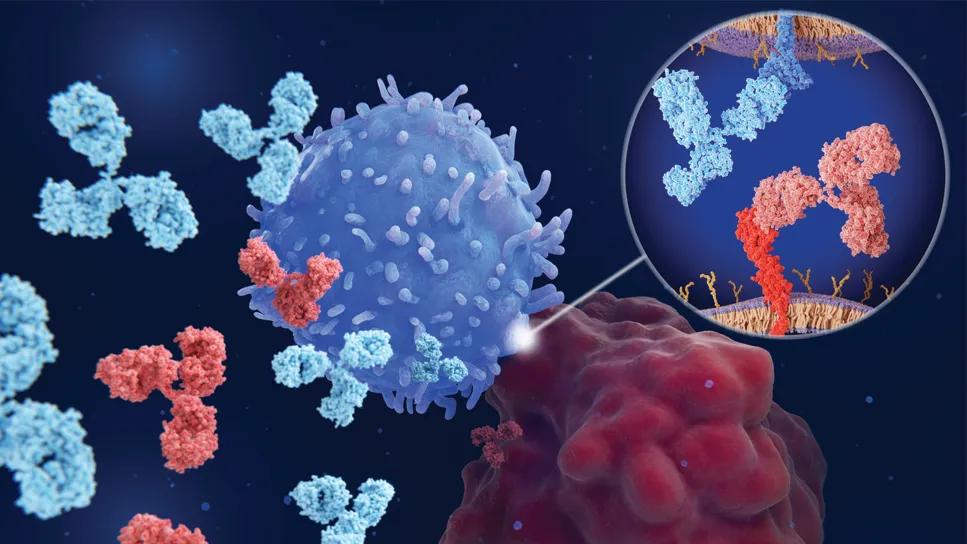Community-based data help predict patients’ response to immune checkpoint inhibitors

First-line treatment options for patients with metastatic urothelial carcinoma (mUC) who are ineligible to receive cisplatin-based chemotherapy have evolved rapidly in recent years. Single-agent immune checkpoint inhibitors (ICIs) were approved for such cases in 2017 but were later restricted for use only in patients who are ineligible to receive carboplatin. Identifying patients in whom ICIs (e.g., pembrolizumab and atezolizumab) could be of benefit — particularly those who are not well-suited for chemotherapy — remains a clinical challenge.
Advertisement
Cleveland Clinic is a non-profit academic medical center. Advertising on our site helps support our mission. We do not endorse non-Cleveland Clinic products or services. Policy
A new real-world study by Cleveland Clinic researchers suggests that tumor mutational burden (TMB) may help predict the response to ICIs in patients with mUC who are ineligible for chemotherapy. The findings were presented at the American Society of Clinical Oncology’s Genitourinary Cancers Symposium in February 2022.
“Our results show that patients with a TMB of 10 mut/MB or higher who received immunotherapy did better than those with a TMB less than 10 in terms of progression-free survival, time to next treatment, and overall survival,” explains Shilpa Gupta, MD, Director of Genitourinary Medical Oncology at Taussig Cancer Institute and co-leader of the Genitourinary Oncology Program at Cleveland Clinic Cancer Center.
Study authors used data on patients who received first-line treatment for cisplatin-ineligible patients with mUC in 280 U.S. academic community-based cancer clinics in the United States between January 2011 and April 2021. Of the 849 patients included, 307 were given ICIs and 542 were given carboplatin-based chemotherapy at their physician’s discretion in standard-of-care settings.
All of the patients in the study cohort underwent genomic testing using a Foundation Medicine comprehensive genomic profiling assay. The authors used propensity scoring to assess progression-free survival (PFS) and overall survival (OCs), both unadjusted and adjusted for imbalances.
Of the 849 patients, 273 (32.2%) had TMB of 10 or more. TMB was comparable in those given ICIs vs. chemotherapy, as were primary disease site, smoking status, and programmed death ligand-1 (PD-L1) staining. The patients who received ICIs were older (median 72 vs 67 years, P<0.001), had higher Eastern Cooperative Oncology Group scores (P<0.001), lower creatine clearance (median mL/min: 49.8 vs. 59.7, P<0.001), and lower hemoglobin (median: 11.5 vs. 12.1, P<0.001).
Advertisement
Overall, having a TMB of 10 or above was associated with more favorable PFS (hazard ratio [HR] 0.72, 95% confidence interval [CI]: 0.52-0.99, P=0.44) and OS (HR: 0.70, 95% CI 0.49-0.1, P=0.048). Looking at outcomes in patients who received ICIs vs. chemotherapy and had a TMB above 10 vs. below 10, the authors reported similar results. The patients in both treatment groups with a TMB of 10 or higher had more favorable PFS (HR: 0.65, 95% CI 0.45-0.95, P=0.026) and OS (HR: 0.61, 95% CI 0.39-0.93, P=0.022) and the group with TMBs below 10 had comparable or less-favorable PFS (HR: 1.30, 95% CI 0.98-1.72, P=0.06) and OS (HR: 1.03, 95% CI 0.78-1.34, P=0.85).
“Our research showed that high TMB consistently led to better outcomes with immunotherapy – a finding that is in line with reports from the phase 3 DANUBE and IMvigor 130 trials,” explains Dr. Gupta. “This tells us that high TMB, as assessed by an FDA-approved assay, has strong clinical application for identifying patients who may benefit from immunotherapy rather than carboplatin-based chemotherapy.”
Dr. Gupta underscores that the study presented at ASCO was not a randomized clinical trial. Thus, the next step for the Cleveland Clinic team is to validate their results in a larger study.
Although TMB is not proven or approved for use as predictive marker by clinicians to determine whether their patients with mUC should receive chemotherapy or immunotherapy, Dr. Gupta believes the study findings can play a role in patient counseling.
Advertisement
“The scientific evidence on TMB could be used as a complementary tool to aid shared-decision making about the use of chemotherapy versus immunotherapy in mUC patients,” says Dr. Gupta. “For example, knowing that a particular TMB is high might provide reassurance about the use of an ICI in a patient who meets the criteria for chemotherapy but wants to avoid it. Conversely, the information may support an argument against the use of ICIs in a patient with a low TMB who is hesitant about chemotherapy.”
Advertisement
Advertisement

Combining advanced imaging with targeted therapy in prostate cancer and neuroendocrine tumors

Early results show strong clinical benefit rates

The shifting role of cell therapy and steroids in the relapsed/refractory setting

Radiation therapy helped shrink hand nodules and improve functionality

Standard of care is linked to better outcomes, but disease recurrence and other risk factors often drive alternative approaches

Phase 1 study demonstrates immune response in three quarters of patients with triple-negative breast cancer

Multidisciplinary teams bring pathological and clinical expertise

Genetic variants exist irrespective of family history or other contributing factors